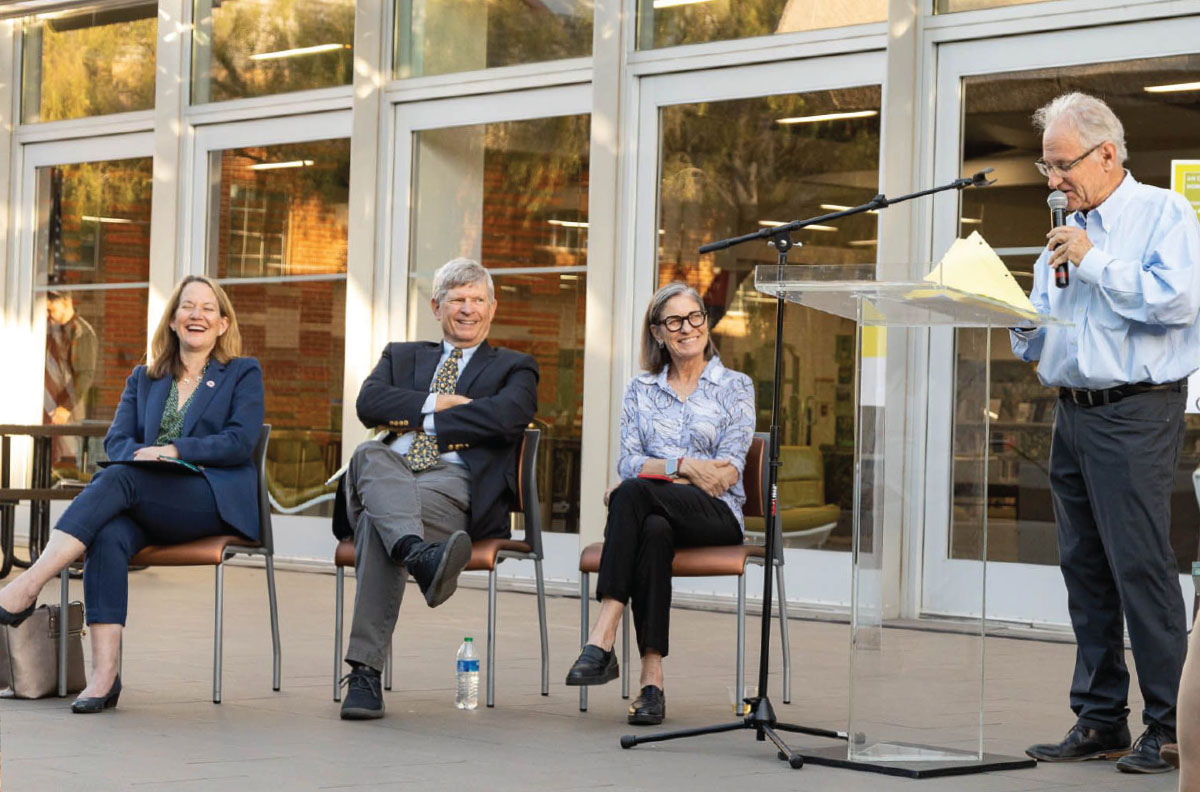
Equal Before the Law
Step Up to Justice Offers Free Civil Legal Aid
By Dave Perry
Michele Mirto, executive director of Step Up to Justice, cannot think of a single day she’s left the office “feeling like we haven’t made a difference for someone.”
Qualifying, low-income clients turn to this Tucson nonprofit for free civil legal help. They might be renters facing eviction, grandparents seeking guardianship of grandchildren, or victims of domestic violence trying to move forward. They need an attorney, but can’t afford one. Step Up to Justice steps up with a volunteer lawyer, at no charge.
“We’re seeing people every day whose lives are changed by the work of our volunteers,” Mirto said. “It’s an amazing thing to watch. I feel very privileged that this is my job.”
“I was always under the impression if you couldn’t afford a lawyer, one would be provided to you,” said Lisa Lovallo, VP and system manager for Cox Enterprises, and chair of the SU2J board.
That’s true in criminal law, Mirto points out, but not civil law. “It’s shocking to people” when they learn of that gap in justice, she said.
“I can’t imagine standing in front of a judge without a lawyer by my side,” Lovallo said. “No one in Tucson should have to do that. We can solve this challenge by supporting Step Up to Justice.”
More than 200,000 Pima County residents are considered impoverished. Each year, about 140,000 of them have a civil legal need. Since its founding in 2017, through the end of May, SU2J has helped 8,350 clients. “Our impact in the community has been significant, and it’s growing every day,” Mirto said.
About 40% of SU2J clients need help with family law. Another 30% need help with housing, be it rent delinquency or living conditions. Clients are screened based on financial eligibility and case merits. SU2J also gives them a “personal handoff” to any one of 26 community partners who help low-income people.
For more than 20 years, Mirto worked as an attorney at Southern Arizona Legal Aid, providing free legal services.
“It was wonderful work,” she said, “but we were turning people away, back into the community every day. That never sat right with us.” It often happened because of legal conflicts. Tucson didn’t have a second provider.
Judges, attorneys, social justice advocates, Mirto and SU2J associate director Melissa Spiller-Shiner created the organization from the ground floor.
“We had an idea about how to do this,” Mirto said. The use of volunteer attorneys, 245 of them right now, is at the core of the service. “That’s very different than a traditional legal aid model. … We thought it would work, and it has.”
SU2J has grown from three employees to 10, from an annual budget of about $200,000 to $709,000. “It’s been a real growth experience,” Mirto said. Funds come evenly from donors, grants, and events. SU2J is a 501(c)(3) that can receive Arizona income tax charitable credits.
“One of the conscious decisions our board made was not to take any federal funding,” Mirto said. By doing so, “our doors are open to everyone financially eligible to receive services.”
This year, SU2J wants to assist 2,000 clients, recruit 25 more attorneys and strengthen its “upstream education,” reaching low-income people before urgency arrives so they know their legal rights and responsibilities regarding housing, contracts, and end-of-life planning. To do all that, it needs people “to invest in our work,” Mirto said.
“Maybe it’s not as obvious as a food bank,” she said. But legal services, or their absence, can “really impact every aspect of someone’s life.” When SU2J can prevent an eviction, for example, kids stay in their schools, and families stay off the streets. “To the extent we can make this a better and safer place to live, that benefits everyone,” she said.
Ryan Anderson, a trained attorney and now the manager of business development for Tucson Electric Power, serves on the SU2J board. He performed volunteer civil legal work for Tucsonans trying to stabilize their families. “Case by case, I felt I was making a difference,” Anderson said.
Then, shortly after he joined TEP, he learned about SU2J. He already knew Mirto and Spiller-Shiner were “dynamic and effective,” saw the coalition of volunteer lawyers the nonprofit was ready to empower, and was eager to serve on the board.
“I believe that SU2J has the right people and programs to help Pima County’s most vulnerable residents fight for a better life,” Anderson said.
Lovallo said Cox supports SU2J “because we believe that everyone in our community should have access to legal services, regardless of their economic status.”
Pictured above From left – Kris Mayes, Arizona Attorney General; Daniel Barr, Chief Deputy Arizona Attorney General; Lisa Lovallo, VP & System Manager for Cox Enterprises, and chair of the Step Up to Justice board; Former Tucson Mayor Jonathan Rothschild





